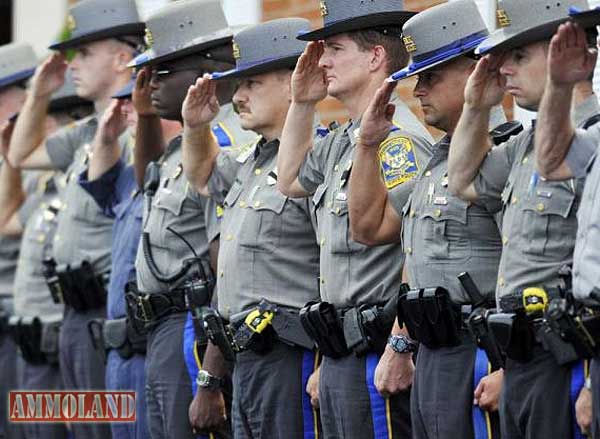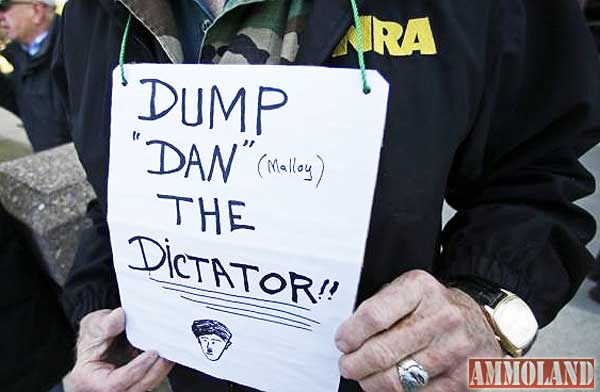Meanwhile NRA Continues the Fight.


Charlotte, NC –-(Ammoland.com)- On April 4, 2013, Connecticut Governor Dan Malloy (D) signed Senate Bill 1160 into law, unleashing one of the most draconian gun control laws in the nation on his constituents.
Among other things, the 140-page law bans large classes of firearms and magazines that had been obtained lawfully by tens of thousands of Connecticut residents.
Limited grandfather provisions apply to those who registered otherwise banned items before January 1, 2014. Others in possession could face felony penalties for violations. President Obama himself was in Connecticut four days after this bill became law, praising it as a model for the nation.
Throughout the Connecticut lawmakers’ efforts to attack law-abiding gun owners, your NRA has been actively involved in fighting to vindicate the Second Amendment rights of Connecticut’s citizens. Shortly before the bill was rammed through the state legislature with no opportunity for public debate or even for adequate committee review, the NRA helped organize a huge lobby day protest rally in conjunction with the National Shooting Sports Foundation, the Connecticut Citizens Defense League and the Coalition of Connecticut Sportsmen. Thousands turned out peacefully to protest the proposed legislation and the incursions on their rights that would undoubtedly result from it.

The NRA is currently backing a lawsuit, Shew v. Malloy, to challenge the constitutionality of several provisions of the law, including its expanded bans on semiautomatic firearms and its restrictions on magazine capacity. Some have wondered why the NRA has not appeared as a named plaintiff in the suit. Simply put, experience has often shown that NRA is more effective in lending its expertise and resources, rather than its name, to litigation. Many within the legal elite have been slow to embrace the fundamental, individual rights protected by the Second Amendment, and getting a fair hearing on these matters is difficult enough. When NRA participates in a legal case as a plaintiff, its involvement attracts a traveling media circus eager to criticize and attempt to discredit whatever it does. This can further inhibit courts from giving the merits of the case a thorough and impartial hearing. Unlike some groups who will eagerly tout their participation in any “gun rights” case, no matter how ill-advised or unlikely to succeed, the NRA is more interested in advancing our Second Amendment freedoms through litigation, rather than just using lawsuits for publicity or fundraising purposes.
In any event, a federal district court judge has, for now, upheld the contested provisions of the law. An appeal is already underway. The court’s ruling, while unfavorable on the law, contained important factual findings, including that the newly-banned firearms and magazines are, in fact, commonly owned and legally used nationwide, including in Connecticut. These findings could well make a difference as the case makes its way through the appeals process.
While relief through the court system is at best a long and incremental process, the effort continues with NRA’s full support.
Meanwhile, reality is setting in for Connecticut lawmakers and enforcement officials, who now must deal with the effects the new law is having on ordinary persons who have never been at odds with the law. As in other states that have recently enacted draconian gun control measures, SB 1160 has caused good jobs and honest business interests to leave the state, unwilling to shoulder the blame for acts committed by criminals that tore at the heart of the business owners and their employees along with all of the good people in Connecticut.
Even supporters of the law now widely acknowledge that tens of thousands of existing firearms and untold numbers of magazines have not been registered as required. In other words, Connecticut’s politicians have created from whole cloth an entirely new class of criminals. These are otherwise ordinary people who work at legitimate jobs, pay taxes, and undoubtedly in many cases are raising families and running businesses that employ others and contribute to the general welfare of the state.
These are individuals who have never used firearms unlawfully and have no intention of ever doing so. They had merely chosen to protect their homes and families and pursue their sporting interests with what federal judges are now recognizing as common firearms used in-state and throughout the nation for lawful purposes. At the time they acquired the firearms, they were perfectly lawful. Now, these people have become the scapegoats for the heinous acts of a handful of criminals. Now, they are the pawns in a larger political fight going back decades, when gun control supporters realized that handgun bans would not work, and other avenues would have to be used to condition the public to accept gun bans.
Only last week, multiple reports surfaced of a disturbing letter that had reportedly been sent to Connecticut gun owners who tried to register their firearms but whose paperwork arrived at the Connecticut State Police (“CSP”) after the deadline. That letter, dated January 2, 2014, and containing the signature of a State Police lieutenant, gave recipients four choices for disposition of their firearms, none of which indicated they would be given a pass for their late submission. Rumors swirled, as some claimed this was the precursor to a later campaign of outright confiscation, even by those who tried to comply with the registration aspects of the law but failed because of early Post Office closures or mistakes in paperwork.
The Connecticut State Police did nothing helpful to alleviate these concerns. As one rumor after another was reported in breathless media accounts, your NRA was diligently working behind the scenes to learn the truth. Our experience was consistent with other reports that have since emerged, in that answers received from CSP officials seemed to vary with whoever happened to answer the telephone. Some said a letter was being drafted but had not been sent. Others denied the existence of the letter categorically. Finally, after NRA personnel identified themselves as such and demanded to speak with high ranking officials, confronted these officials with the CSP’s inconsistent answers, and insisted on knowing the truth, the CSP reversed course and admitted to NRA that the letter was authentic and that it had been sent to a number of individuals whose registration paperwork was received after the deadline. Nevertheless, the officials insisted it was not a warning of later confiscation but a “public service” to advise gun owners whose registrations were rejected of their options.
Media reports also indicate that the CSP in some cases is willing to grant limited “amnesty” to persons who are believed to have completed the registration requirements prior to the deadline but whose paperwork was received late because of circumstances beyond the registrant’s control. We find none of this reassuring. Simply put, the rule of law has broken down in Connecticut and the Malloy administration’s and CSP’s credibility on this issue has been severely compromised. Nobody seems to know what the state’s intentions are toward residents who have committed purely technical violations of the law, whether or not they unsuccessfully attempted to register their firearms on time. While we agree that evidence of unsuccessful attempts at registration should not be used to prosecute the registrants, the process of choosing who is and is not eligible for “amnesty” seems to be wide open, with no oversight to ensure consistency or fairness.
In short, Connecticut’s approach to this issue is a glaring example of arbitrary and capricious enforcement of what was bad public policy in the first place.
The only safe choice for those Connecticut gun owners who have not successfully registered their firearms (whether or not intentionally) is to assume enforcement action remains a very real possibility with very serious consequences. Nevertheless, we certainly hope the Malloy administration and the CSP will devote their limited resources to focusing on truly dangerous individuals who have no regard for any laws or the lives or well-being of others. They are the proper targets of law enforcement efforts, and not responsible gun owners who were in perfect compliance with the law until a rushed and deeply flawed bill was passed with no chance for public input.

As for the legislature, they should repeal this ill-considered, politically-motivated law with the Orwellian title of “An Act Concerning Gun Violence Prevention and Children’s Safety.” Children are not safe when their parents are classified as criminals subject to arrest and imprisonment for the earlier acquisition of property that was undertaken lawfully and in good faith and which threatens harm to no one in the present. Children are not safe when the next knock at the door could be an armed squad of policemen who are serving warrants against a class of citizens who have done nothing to harm others but have summarily been condemned as “armed criminals.”
The rule of law is in tatters in the “Constitution State,” and whatever ambiguities remain or misadventures may yet come to pass, one thing is crystal clear: Governor Malloy and those who voted for SB 1160 in the state legislature are responsible for them.
In the meantime, Connecticut gun owners can be sure that the NRA is standing with them to fight this injustice every step of the way.
About:
Established in 1975, the Institute for Legislative Action (ILA) is the “lobbying” arm of the National Rifle Association of America. ILA is responsible for preserving the right of all law-abiding individuals in the legislative, political, and legal arenas, to purchase, possess and use firearms for legitimate purposes as guaranteed by the Second Amendment to the U.S. Constitution. Visit: www.nra.org
